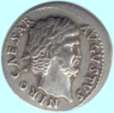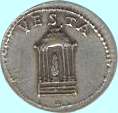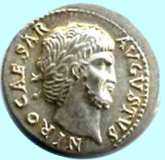|
Assemini, 10.11.2009
Egregio
Lettore,
di seguito
riporto i dati significativi pertinenti alla sua
moneta:
Denario1, zecca di Roma, c. 65-66 d. C., RIC I
62 (pag. 153), BMC I
104 (pag. 213), Cohen
I 334 (pag. 301), indice di rarità
"R"
Descrizione
sommaria (sono indicate in rosso le parti della
leggenda usurate o comunque non più leggibili):
D. NERO CAESAR AVGVSTVS2. Testa di Nerone laureata a destra,
leggende che iniziano in basso a sinistra. Bordo
perlinato.
R. VESTA3. Tempio esastilo a cupola con tre
gradini; all'interno Vesta drappeggiata, seduta
frontalmente, testa a sinistra, sorregge una patera
con la mano destra e un lungo scettro con la
sinistra. Bordo perlinato.
Di seguito
riporto i link a monete uguali a quella di figura
reperite nel web:
- http://www.wildwinds.com/coins/sear5/s1946.html
NERO . 54-68 AD. Silver Denarius, 17mm (3.29 gm).
. R: Vesta seated within circular hexastyle
temple. cf. RIC. 62. aVF.Current bid: US
$86.01 (Reserve not met) Ended:
Feb-09-06.
- http://www.wildwinds.com/coins/ric/nero/RIC_0062.2.jpg
This piece was minted between 64 and 68 AD, during
the reign of Nero, who ruled from 54-68 AD. Nero
assumed the purple on the death of Claudius, an
event that was hastened by Nero's mother and
Claudius' wife, Agrippina Junior. At first, Nero
showed promise, as he was in the hands of the
capable Seneca and Burrus. However, Nero soon
decided to free himself from all restraints, and
his conduct became unbridled. He was very
enthusiastic about art and sport, engaging in both
the theater and in chariot racing, both of which
were considered activities hardly befitting an
emperor. His excesses and vanity made him very
unpopular, and it was only a matter of time before
revolts broke out across the empire, triggering
the civil wars of 68-69. Nero himself would be
driven from Rome and declared a public enemy, and
would committ suicide in 68 AD. The obverse of
this piece depicts the laureate head of Nero
facing right, with legends NERO.CAESAR.AVGVSTVS.
The reverse features a temple of six columns, with
Vesta seated within. The legend VESTA appears
above. This type was minted to mark the
commemcement of the rebuliding of the Temple of
Vesta, which was destroyed in the great fire of 64
AD. The rebuilding was finally completed during
the reign of Vespasian. Coin is struck on a
smallish flan, but otherwise grades F, with clear
devices and nearly all legends visible. A nice
example of this scarcer historical type of the
infamous Nero. This piece is catalouged as
RSC-335.
- http://www.wildwinds.com/coins/ric/nero/RIC_0062.3.jpg
Nero. 54-68 AD. AR Denarius (3.08 gm).
Struck 65-66 AD. Laureate head right / VESTA,
hexastyle temple of Vesta with domed roof; statue
of Vesta within. RIC I 62; BMCRE 104; BN 229; WCN
29; RSC 335. Good VF/VF. Currently $300.00.
05/19/99.
- http://www.wildwinds.com/coins/ric/nero/RIC_0062.4.jpg
Nero Den "Temple of Vesta" RARE Nero AD 54-68
Silver Denarius "Nero, caretaker of the greater
'Roman' family" Obv: NERO CAESAR AVGVSTVS -
Laureate head right Rev: VESTA - Temple with four
steps, six columns and a conical roof containing a
statue of Vesta standing right.3.2gm. Rome mint AD
64-68 = RIC 62 RARE, BMC 104, page 153, RIC I
revised 1984. NICE PORTRAIT Currently$129.00
Nov-01-01.
- http://www.wildwinds.com/coins/ric/nero/RIC_0062.6.jpg
NERO (Lucius Domitius Ahenobarbus, adopted by
Claudius as Nero Claudius Caesar Drusus Germanicus
Emperor AD 54-68 Denarius (Silver, 3.3 grams,
16.66 mm) Obverse: IMP.NERO CAESAR AVGVSTVS, His
laureate head right Reverse: Vesta seated facing
in hexastyle circular temple Current US $130.50
Jan-10-03.
Concludo
ricordando che le monete in esame fanno parte di una
serie emessa negli anni 80 dalla Parmalat come gadget
pubblicitari di una linea di prodotti dolciari
(biscotti/merendine per bambini) denominata Mister Day
(v. link).
Tutte
le
monete
della
serie
recano una piccola "R" sul rovescio ad indicare che
sono riproduzioni. In fig. 2 ho inserito un'altra
moneta della stessa tipologia in cui la "R" è meglio
evidenziata. Un'ultima osservazione è che, essendo le
monete in esame il risultato di una produzione
industriale, presentano caratteristiche fisiche più o
meno identiche (peso, diametro e forma del contorno) e
in ciò si differenziano dalle monete romane autentiche
che, prodotte semiartigianalmente, non garantivano
elevati standard di uniformità. In considerazione
della larga diffusione di queste monete e del loro
contenuto didattico, ritengo utile farne oggetto di
trattazione in questa rubrica.
Un saluto
cordiale.
Giulio De
Florio
-------------------------------
Note:
(1) Denario (argento). Traggo dai link sopra citati e dal
data base dell'ANS
(American Numismatic Society) le caratteristiche
fisiche dei denari della tipologia di figura:
| Riferimenti |
Peso (g.) |
Asse di conio (ore) |
Diametro (mm) |
| link1 |
3,29 |
- |
17 |
| link3 |
3,08 |
- |
- |
| link4 |
3,20 |
- |
- |
| link5 |
3,30 |
- |
16,66 |
| ANS1 |
3,31 |
6 |
- |
| ANS2 |
3,07 |
6 |
18 |
(2) NERO CAESAR AVGustus. Per il profilo
storico di Nerone rimando alla voce relativa
dell'Enciclopedia Treccani on line (v. link).
(3) VESTA. Per i riferimenti storici al
tempio di Vesta rimando alla breve sintesi fornita dal
sito http://www.archeoroma.com/Foro%20Romano/tempio_di_vesta.htm.
Per approfondimenti vedere anche http://en.wikipedia.org/wiki/Temple_of_Vesta. |




